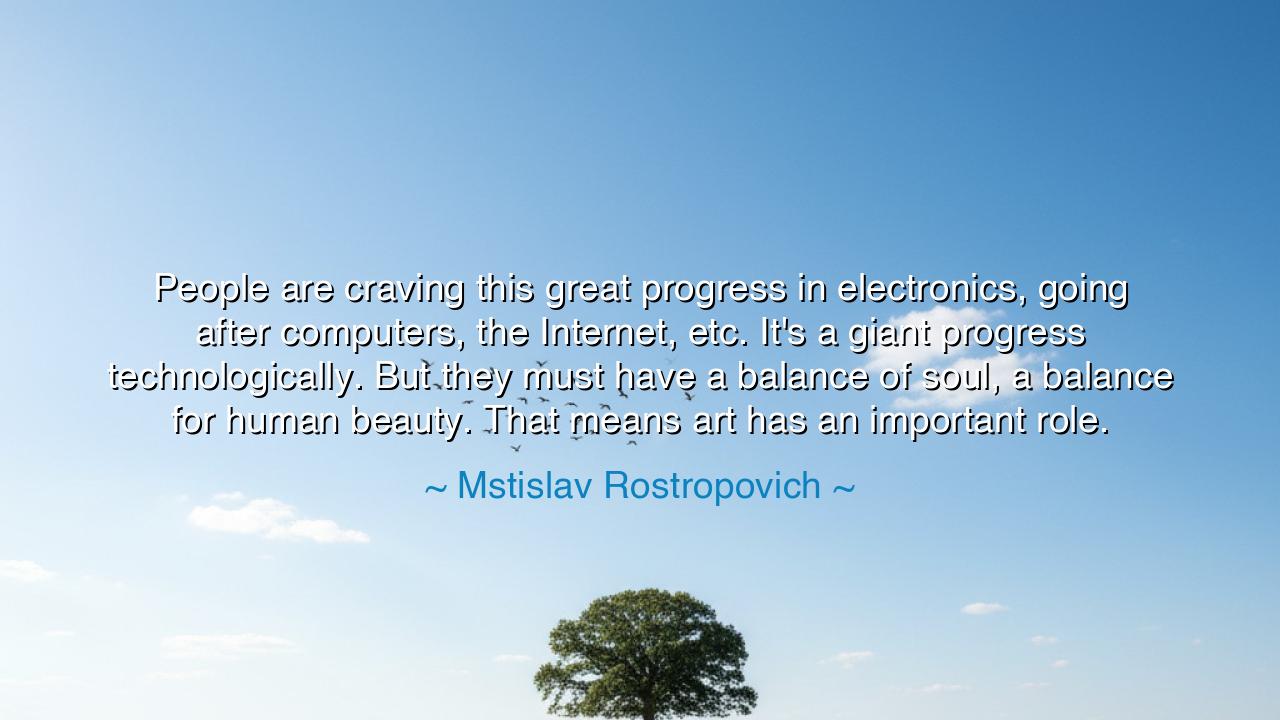
People are craving this great progress in electronics, going
People are craving this great progress in electronics, going after computers, the Internet, etc. It's a giant progress technologically. But they must have a balance of soul, a balance for human beauty. That means art has an important role.






In the ceaseless march of human progress, where technology advances at a pace that often seems to outstrip the very heartbeat of civilization, there is a voice of profound wisdom in the words of Mstislav Rostropovich: “People are craving this great progress in electronics, going after computers, the Internet, etc. It’s a giant progress technologically. But they must have a balance of soul, a balance for human beauty. That means art has an important role.” These words, spoken by a man who devoted his life to the soul-stirring language of music, remind us of a truth that has echoed throughout time: human progress must be tempered with the nourishment of the spirit. For all the triumphs of the intellect, we must not forget the beauty and emotion that connect us to each other and to the world.
In the ancient world, the pursuit of knowledge was always balanced by the desire for beauty and harmony. Plato, the great philosopher, often spoke of the forms—those eternal ideals that transcended the physical world, of which beauty was the highest. He understood that without beauty, without the expression of the soul through art, society would fall into a dissonance that would hinder its progress. The ancient Greeks were not only creators of philosophy and science but also of sculpture, music, and theater. The Parthenon was not simply a structure of stone; it was a testament to the marriage of reason and art, a reminder that human greatness is found in the union of intellect and soul.
Rostropovich's statement speaks to a modern dilemma that has existed for ages. As our world becomes more technologically advanced, we risk losing touch with the essence of what makes us human: our capacity for love, empathy, and the deep beauty that art provides. Consider, for instance, the rise of Roman Empire: though it was a civilization marked by military conquests and architectural feats, it was the Roman empire’s appreciation for art—its poets, philosophers, and musicians—that immortalized it. The structures of power may have crumbled, but the ideas of beauty, captured in sculpture and literature, still resonate today. Similarly, Rostropovich warns that as we race toward digital mastery, we must ensure that beauty does not become a lost language.
The great Renaissance masters, like Leonardo da Vinci and Michelangelo, knew that the key to human flourishing lay in balancing the tangible with the intangible. They created works of astonishing beauty, not only to delight the senses but to elevate the human spirit. Leonardo’s Vitruvian Man and Michelangelo’s David were not mere representations of the human form; they were expressions of the harmonious relationship between nature, mathematics, and the soul. These works remind us that art is not just a luxury, but a necessity—a way to connect with the profound aspects of life that cannot be reduced to numbers or algorithms.
Rostropovich’s wisdom is also a reminder of balance—the essential truth that no matter how advanced our technology becomes, we must not let it drown out the spiritual needs of our lives. Just as the early philosophers warned of the dangers of excess, so too must we recognize that a society that places too much emphasis on the practical and the mechanical risks losing its soul. Technology, for all its promise, cannot replace the emotional resonance of music, the aesthetic beauty of a painting, or the inspiring depth of literature. These are the things that speak to us not through the intellect, but through the heart.
So, the lesson here is clear: we must strive for balance. As we push forward into an age of unprecedented technological growth, we must not lose sight of the beauty that art brings into our lives. The progress of the mind must be accompanied by the nourishment of the soul. For it is through art that we connect to the deeper currents of life—those that transcend the physical and speak to the human condition itself. In our daily lives, we must not forget to cultivate the inner beauty that feeds the spirit, whether it is through music, painting, poetry, or simply the act of sharing in human experiences that stir the heart.
As we move into the future, let us take Rostropovich’s words to heart. Let us remember that technology and art are not opposing forces, but two sides of the same coin. The former may expand the mind, but it is the latter that nourishes the heart. By ensuring that both are given their rightful place in our lives, we can create a world where human beauty and technological progress are not at odds, but work together in harmony to shape a future that is not only smart but truly beautiful. The soul is the compass that should guide our creations, for without it, progress is but a hollow victory.






AAdministratorAdministrator
Welcome, honored guests. Please leave a comment, we will respond soon